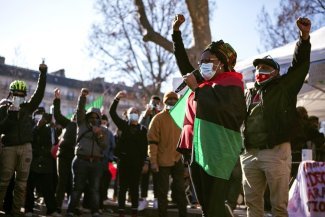Tens of thousands of immigrants and immigrant rights activists, from unions, churches, universities and communities throughout the country, rallied on 10 April for the reform of US immigration laws.
On the same day, however, a group of legislators in the US Senate announced reform proposals that moved only slightly towards fulfilling their demands, while simultaneously proposing other changes that would make US immigration policy much harsher for immigrants and workers.
In San Diego, California, nine activists completed six days of a hunger strike outside the Mission Valley Hilton Hotel, protesting the firing of 14 of the hotel’s workers.
In March, the company told workers that it had used the government’s E-Verify database to determine that they didn’t have legal immigration status, and was therefore firing them.
“The company says that E-Verify is making them do this, even though many of the workers have been working here for years,” said Sara Garcia, a supporter and hunger striker from the House of Organized Neighbors, a local community organisation.
“But they started firing them when the workers were organizing a union.”
“Many companies are doing the same thing,” explained Leticia Nava, a fired worker. “I was fired the same way two years ago. Now my children are all scared because they see it’s harder for me every day.
The impact on us is not just money - it affects all aspects of my life.”
Garcia and Nava accuse the company of using the government system for immigration enforcement in the workplace, a database called E-Verify, in order to retaliate against 14 women for their union support.
But they also say that the E-Verify system is used much more extensively, to fire workers even where no union organising is taking place. Both agreed that getting rid of E-Verify should be part of immigration reform.
Legalisation
The Hilton workers and their supporters, as well as the union helping them, UniteHere, all believe that immigration reform should also include a legalisation process that would give the 11-12 million undocumented people living in the United States a quick and accessible way to gain legal status.
That demand ran through demonstrations around the country on 10 April, from the 30,000 people on the mall in front of the Capitol Building in Washington DC to the thousand marchers in San Francisco.
It was voiced by janitors and security guards in Silicon Valley, and by teachers and elementary school students in Berkeley, California.
Congress, however, proposes both to limit its proposed legalisation process, and to exact a price for it, including increases in the severity of many of the anti-immigrant measures already part of US law, such as the E-Verify system.
The day following the demonstrations, the “Gang of Eight” Senators drafting the reform bill announced the system would be extended, and made mandatory on all employers.
The Senators’ legalisation plan would require undocumented people to spend a decade in a provisional status before being able to apply for permanent legal residence.
Then they would have to maintain that status for another three years before they could apply to become citizens, and gain basic political rights.
“Broken policies”
The idea of long waiting periods and obstacles was criticised by AFL-CIO President Richard L. Trumka, who warned, “Families, including siblings and children must not pay the price of our broken policies.”
An even greater shift in US immigration policy is in the works, however.
The Senators chipped away at the family preference system itself.
They announced that there would no longer be a preference for brothers and sisters, while at the same time their bill would create a new program giving 138,000 visas a year to people with the work skills demanded by US employers.
Even more direct labor supply schemes will be part of the Senators’ proposals.
Currently the three main official guest worker visa programs, H1B, H2A and H2B, allow employers to recruit about 250,000 workers outside the country every year, and bring them with visas that require them to work in order to stay.
In parallel with the Senators’ deliberations, the AFL-CIO and the US Chamber of Commerce announced agreement on yet another such program, called the W visa.
It would allow employers to recruit workers to fill labour shortages documented by a new Federal agency, require them to recruit locally first, and peg wages of guest workers to an employer’s existing wage scale or to prevailing wages in the industry in which they’re recruited.
Workers would be able to change jobs and apply for residence after a year.
Labour supply
Making a deal on a new guest worker program is a means to win over employer-friendly Senators and Representatives.
In its mobilisation efforts around the country, the AFL-CIO and other Washington DC-based lobbying groups have announced their central priority is a “pathway to citizenship” – that is, a legalisation program for the undocumented.
“There is absolutely no distinction,” said Trumka at an event kicking off a 10 April rally, “between workers who were born in this country and those who came here to build a better life. We’re all in the same boat, every one of us who works for a living. We rise or fall together.”
Other organisations, however, have been critical of those aspects of the Senators’ plan that will increase enforcement and expand labour supply programs.
Communications Workers of America President Larry Cohen warned “CWA will monitor any proposed changes to visa programs like the H-1B visa, which are sought after by business but have cost US technicians and other workers tens of thousands of jobs.”
Columbia professor and former labour organiser Mae Ngai noted in the New York Times “From the agricultural ‘Bracero Program’ of the 1940s and 1950s to the current H-2 visa for temporary unskilled labour, these programs are notorious for employer abuse.”
Reverend Deborah Lee of the Interfaith Coalition for Immigrant Rights in Oakland, California, predicted that unions and immigrant rights organisations might eventually be divided over whether to support Congressional reform proposals.
“A lot of families are suffering now because of earlier immigration deals trading legalisation for more enforcement. We need to think long term - if the deals today are going to create more problems for families in the future?”









